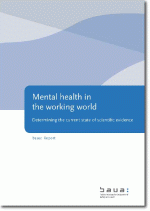Mental Health in the Working World Focus Programme, 2014-2017
The aims of this wide-ranging focus programme were to determine the current state of scientific evidence about working conditions as factors in employees’ mental health and identify starting points for action that would promote human-centred work design.

The goal of the research project was to advance the level of knowledge surrounding working conditions relating to mental health in the world of work, to assess the transferability of the available knowledge to changing working conditions, and to identify knowledge gaps relating to mental load factors, mental load constellations and their impact on the individual. In addition, available knowledge of work design and existing research deficits were also identified.
In the "Mental Health in the Working World" project, scoping reviews were prepared for more than 20 working condition factors, which were assigned to four subject areas: "work tasks", "leadership and organisation", "working time" and "technical factors".
"Work tasks" subject area
- Latitude for activity at work
- Job control, assignment variability
- Complete tasks
- Work intensity
- Disturbances and interruptions
- Emotional labour
- Traumatic stress
"Leadership and organisation" subject area
- Leadership
- Social relationships
- Feedback
- Justice and reward
- Atypical forms of employment
- Job insecurity
"Working time" subject area
- Atypical working time
- Rest Breaks
- Detachment
- Mobility
- Work-related extended availability
- Work-life balance
"Technical factors" subject area
- Noise
- Lighting
- Climate
- Human-machine interaction
- Human-computer interaction
"Work design approaches" interdisciplinary topic
- Organisational resilience
The project was divided into three phases and received close technical support from a committee of BAuA's Scientific Advisory Board.
Phase 1 - Knowledge preparation
In this phase, scoping reviews were compiled on the relationship between working condition factors and mental health. These describe the available level of knowledge. The compilation of the scoping reviews was also oriented to a common set of guidelines.
Phase 2 - Deepening the knowledge
In this phase, BAuA invited scientists to expert discussions and requested feed-back about the scoping reviews. At the expert meetings, cross-cutting questions took centre stage among others, on interdependencies and research gaps, on options for work design, and on the relevance of the topics in the changing world of work. Suggestions from the comments and expert meetings were subsequently used by BAuA in order to revise the scoping reviews.
Phase 3 - Applying the knowledge
In the third phase, the findings were discussed with actors from the worlds of occupational safety and politics. The project was concluded with a report in which the results were presented and recommendations were made regarding occupational safety, health management and related areas of policy.
The final report was presented on 5th May 2017 at a shared event with the Federal Ministry of Labour and Social Affairs (BMAS), the Confederation of German Employers' Associations (BDA) and the German Trade Union Confederation (DGB). It provides the basis for the dialogue process behind "Mental Health in the Working World".
Providing scientific support, and in its role as Chair of the National Conference for Occupational Safety (NAK), BAuA is participating in the dialogue process which is overseen by the BMAS, the DGB and the BDA. This aims to support the organisational implementation of appropriate measures for the supporting and strengthening of mental health. For this purpose, an intensive discussion of the findings of the study should take place, conclusions should be drawn on the conceptualisation of a world of work in which occupational health is prioritised, and specific, measurable goals should be agreed for future implementation.
The dialogue process is accompanied by a steering committee, to which decision makers in the sector associations and individual trade unions are party. Additional partners for ensuring mental health in the world of work (in particular, accident insurers and other social insurance firms) will also be included.
